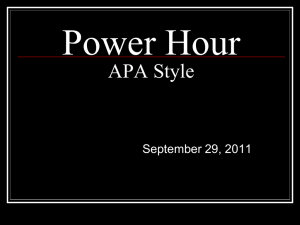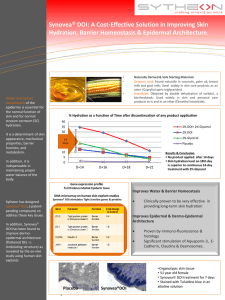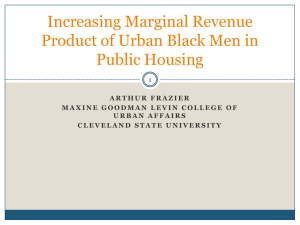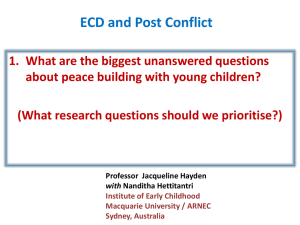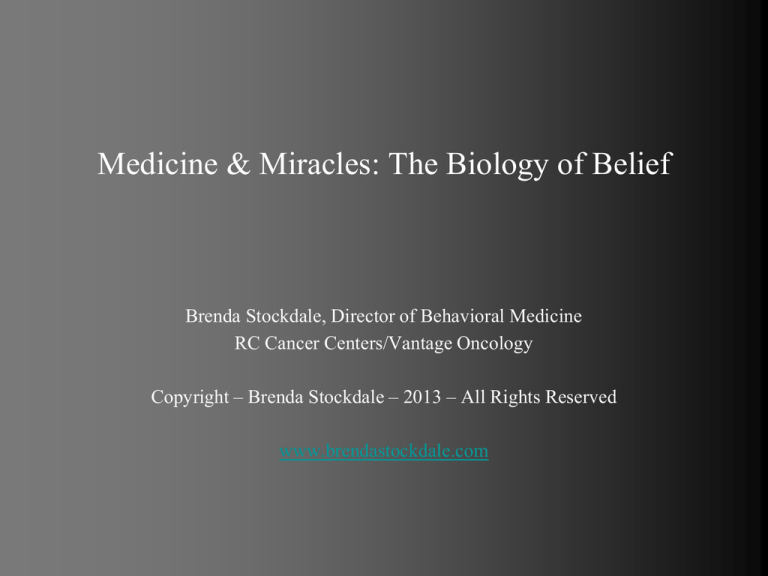
Medicine & Miracles: The Biology of Belief
Brenda Stockdale, Director of Behavioral Medicine
RC Cancer Centers/Vantage Oncology
Copyright – Brenda Stockdale – 2013 – All Rights Reserved
www.brendastockdale.com
“Spontaneous” Remission
• “This [program], in and of itself, is a
prescription for maximizing one's
health."
• -Anne Webster, PhD, Director,
Benson-Henry Institute for Mind Body
Medicine, Harvard Medical School.
Proinflammatory Effect of Stress
Miller, A., Maletic, V. & Raison, C.L. (2009). Inflammation and its discontents: the role of cytokines in the pathophysiology of major depression. Biological Psychiatry, 65, 732-741.
System-wide Endocrine Dysregulation
• Raison, C.L., Borisov, A.S., Woolwine, B.J., Massung, B., Vogt, G. & Miller, A.H.
(2010). Interferon-alpha effects on diurnal hypothalamic-pituitary-adrenal axis
activity: relationship with proinflammatory cytokines and behavior. Molecular
Psychiatry, 15, 535-547.
• Summary: IFN-alpha/ribavirin administration was associated with significant
flattening of the diurnal ACTH and cortisol slope and increased evening plasma
ACTH and cortisol concentrations. These data indicate that chronic exposure to
innate immune cytokines may contribute to the altered diurnal HPA axis activity and
behavior found in medically ill individuals.
Tumor Microenvironment
•
Pyter, L, et al. (2009). Peripheral tumors induce depressive-like behaviors and cytokine
production and alter hypothalamic-pituitary-adrenal axis regulation. Proc Nat Acad Sci, Jun
2;106(22):9069-74. doi: 10.1073/pnas.0811949106.
•
Antoni MH, Lutgendorf SK, Cole SW, Dhabhar FS, Sephton SE, McDonald PG, Stefanek M,
Sood AK. (2006). The influence of bio-behavioural factors on tumour biology: pathways and
mechanisms. Nal Rev Cancer, Mar 6 (3): 240-8.
•
Lutgendorf, S., Sood, A., Antoni, M. (2010). Host factors and cancer progression: biobehavioral
signaling pathways and interventions. J Clin Oncology, 2010 Sep 10;28(26):4094-9. doi:
10.1200/JCO.2009.26.9357.
•
Moreno-Smith, M., Lutgendorf, S., Sood, A. (2010). Impact of stress on cancer metastasis.
Future Oncol, Dec ; 6(12): 1863–1881. doi:10.2217/fon.10.142.
•
Raison, C., Miller, A. (2011). Is depression an inflammatory disorder? Curr Psychiatry Rep,
Dec;13(6):467-75. doi: 10.1007/s11920-011-0232-0.
•
Lamkin, D., Sloan, E., Patel, A., Chiang, B., Ma, J., Arevalo, J., Morizono, K., Cole, S. (2012).
Chronic stress enhances progression of acute lymphoblastic leukemia via β-adrenergic
signaling. Brain Behav Immun, May;26(4):635-41. doi: 10.1016/j.bbi.2012.
Tumor Survival, Proliferation,
Angiogenesis
• L Antonova and C Mueller. (2008). Hydrocortisone down-regulates
the tumor suppressor gene BRCA1 in mammary cells: a possible
molecular link between stress and breast cancer. Genes,
Chromosomes and Cancer, 47: 341-52.
• E Yang et al. (2006). Norepinephrine Up-regulates the Expression of
Vascular Endothelial Growth Factor, Matrix Metalloproteinase
(MMP)-2, and MMP-9 in Nasopharyngeal Carcinoma Tumor Cells.
Cancer Research, 66: 10357-64.
• K Sastry et al. (2006). Epinephrine Protects Cancer Cells from
Apoptosis via Activation of cAMP-dependent Protein Kinase and
BAD Phosphorylation. The Journal of Biological Chemistry, 282:
14094-10.
Insulin Resistance/Blue Light
•
Spiegel, K., Knutson, K., Leproult, R., Tasali, E., Van Cauter, E. (2005). Sleep loss: a novel
risk factor for insulin resistance and Type 2 diabetes. J Appl Physiol 99: 2008 –2019,
doi:10.1152/japplphysiol.00660.
•
Stevens, R. (2009). Light-at-night, circadian disruption and breast cancer: assessment of
existing evidence. International Journal of Epidemiology, 2009;38:963–970.
doi:10.1093/ije/dyp178.
•
Aube ́ M, Roby J, Kocifaj M (2013). Evaluating Potential Spectral Impacts of Various Artificial
Lights on Melatonin Suppression, Photosynthesis, and Star Visibility. PLoS ONE, 8(7): e67798.
doi:10.1371/journal.pone.0067798.
•
Kloog, I., Stevens, R., Haim, A., Portnov, B. (2010). Nighttime light level co-distributes with
breast cancer incidence worldwide. Cancer Causes Control, Dec;21(12):2059-68. doi:
10.1007/s10552-010-9624-4.
•
Kloog, I., Haim, A., Stevens, R., Portnov, B. (2009). Global co-distribution of light at night
(LAN) and cancers of prostate, colon, and lung in men. Chronobiol Int, Jan;26(1):108-25. doi:
10.1080/07420520802694020.
•
Lockley, S., Brainard, G., Czeisler, C. (2003). High Sensitivity of the Human Circadian
Melatonin Rhythm to Resetting by Short Wavelength Light. J Clin Endoc Metab, 88(9): 45024505.
Sleep & Cardiovascular Disease
• Naska, A., et al. (2007). Siesta in Healthy Adults and
Coronary Mortality in the General Population. Archives
of Internal Medicine, 167, 296-301.
• Leineweber C, Kecklund G, Orth-Gomér K. (2007).
Prediction of cardiocerebrovascular and other significant
disease from disturbed sleep and work strain.
Scandinavian Journal of Work, Environment and Health,
Jun;33(3):215-22.
• Loponen, M., Hublin, C., Kalimo, R., Mänttäri, M.,
Tenkanen, L. (2010). Joint effect of self-reported sleep
problems and three components of the metabolic
syndrome on risk of coronary heart disease. Journal of
Psychosomatic Research, 68, 149-58.
Cardiovascular Disease
• Surtees, P., et al. (2008). Psychological distress, major depressive disorder, and risk
of stroke. Neurology, Mar 4;70(10):788-94. doi:
10.1212/01.wnl.0000304109.18563.81
• Virani, S., Khan, A., de Marchena, E. (2007). Takotsubo Cardiomyopathy, or
Broken-Heart Syndrome. Tex Heart Inst J, 34:76-9.
• Madias, J. (2013). Frequency of takotsubo cardiomyopathy in postmenopausal
women presenting with an acute coronary syndrome: still underdiagnosed. Am J
Cardiol, Aug 1;112(3):464-5. doi: 10.1016/j.amjcard.2013.05.046.
• Dong, M., Giles, W., Felitti, V., Anda, R., et al. (2004). Insights Into Causal
Pathways for Ischemic Heart Disease : Adverse Childhood Experiences Study.
Circulation, 110:1761-1766.
• Ma, W., Chen, H., Jiang, L., Song, G., Kan, H. (2011). Stock volatility as a risk
factor for coronary heart disease death. European Heart Journal, 32, 1006–1011,
doi:10.1093/eurheartj/ehq495.
Depression
• Felger, J., Alagbe, O., pace, T., Woolwine, B., Hu, F., Raison, C., Miller A. (2011).
Early activation of p38 mitogen activated protein kinase is associated with interferonalpha-induced depression and fatigue. Brain Behav Immun. August; 25(6): 1094.
• Cohen, L., Cole, S., Sood, A., Prinsloo, S., et. al. (2012). Depressive symptoms and
cortisol rhythmicity predict survival in patients with renal cell carcinoma: a role of
inflammatory signaling. PLoS One, 2012;7(8):e42324. doi:
10.1371/journal.pone.00423
• Miller, A., Maletic, V., Raison, C. (2009). Inflammation and Its Discontents: The
Role of Cytokines in the Pathophysiology of Major Depression. Biol Psychiatry. May
1; 65(9): 732–741. doi:10.1016/j.biopsych.2008.11.029.
• Pyter, L., Pineros, V., Galang, J., McClintock, M., Prenderrast, B. (2009). Peripheral
tumors induce depressive-like behaviors and cytokine production and alter
hypothalamic-pituitary-adrenal axis regulation. Proc Nal Acad Sciences,
2;106(22):9069-74. doi
Post Traumatic Stress Disorder (PTSD)
•
•
•
•
•
26% of cancer survivors exhibited criteria for current or lifetime diagnoses of
PTSD: Stukas, A., et al. (1999). PTSD in Heart Transplant Recipients and Their
Primary Family Caregivers. Psychosomatics, 40, 212-221.
Contribution to allostatic load: Temoshok, L., Waldstein, S., Wald, R., GarzinoDemo, Al, Synowski, S., Sun, L. & Wiley, J. (2008). Type C coping, alexithymia,
and heart rate reactivity are associated independently and differentially with
specific immune mechanisms linked to HIV progression. Brain, Behavior and
Immunity, 22, 781-792.
Boscarino, J. (2004). Posttraumatic stress disorder and physical illness: results
from clinical and epidemiologic studies. Annals of the New York Academy of
Sciences, 1032, 141-53.
Increase in all cause mortality: Ladwig, K., et al. (2008). Posttraumatic stress
symptoms and predicted mortality in patients with implantable cardioverterdefibrillators: results from the prospective living with and implanted
cardioverter-defibrillator study. Archives of General Psychiatry, 65, 1324-30.
O’Donovan, A., et al., (2011). Childhood Trauma Associated with Short
Leukocyte Telomere Length in Posttraumatic Stress Disorder. Biological
Psychiatry, DOI: 10.1016/j.biopsych.2011.01.035.
Post Traumatic Stress Disorder (PTSD)
•
Pace, T., Heim, C. (2011). A short review on the psychoneuroimmunology of
posttraumatic stress disorder: from risk factors to medical comorbidities. Brain
Behav Immun. Jan;25(1):6-13. doi: 10.1016/j.bbi.2010.10.003.
•
Pace, T., Wingenfeld, K., Schmidt, I., Meinlschmidt, G., Hellhammer, D.,
Heim, C. (2012). Increased peripheral NF-κB pathway activity in women with
childhood abuse-related posttraumatic stress disorder. Brain Behav Immun.
Jan;26(1):13-7. doi: 10.1016.
•
Pace, T., Wingenfeld, K., Schmidt, I., Meinlschmidt, G., Hellhammer, D.,
Helm, C. (2012). Increased peripheral NF-kB pathway activity in women with
childhood abuse-related posttraumatic stress disorder. Brain Behav Immun,
Jan;26(1):13-7. doi: 10.1016/j.bb.
•
Pace, T., Mletzko, T., Alagbe, O., Musselman, D. Nemeroff, C., Miller, A.,
Heim, C., (2006). Increased stress-induced inflammatory responses in male
patients with major depression and increased early life stress. Am J Psychiatry.
Sep;163(9):1630-3.
•
Fagundes, C., Glaser, R., Kiecolt-Glaser, J. (2013). Stressful early life
experiences and immune dysregulation across the lifespan. Brain, Behav
Immun, 27:8-12.
Inflammation/Infection
• Clays, E., et al. (2005). Associations Between
Dimensions of Job Stress and Biomarkers of
Inflammation and Infection. Journal of Occupational
and Environmental Medicine, 47, 878-83.
• Cohen, S., Janicki-Deverts, D. & Miller, G.E. (2007).
Psychological stress and disease. Journal of the
American Medical Association, 298, 1685-1687.
• Kemeny, M., Shedlowski, M. (2007). Understanding the
interaction between psychosocial stress and immunerelated diseases: a stepwise progression. Brain, Behavior
and Immunity, 21: 1009-18.
Life Stress
• Epel, E., Blackburn, E., et al. (2004). Accelerated telomere shortening in response to
life stress. Proc Natl Acad Sci, Dec 7;101(49):17312-5.
• K Lillberg et al. (2003). Stressful life events and risk of breast cancer in 10,808
women, a cohort study. Am J Epidemiol, 157: 415-23.
• Cohen, S., Janicki-Deverts, D. & Miller, G.E. (2007). Psychological stress and
disease. JAMA, 298, 1685-1687.
• Dube, S., Fairweather, D., et al. (2009). Cumulative Childhood Stress and
Autoimmune Diseases in Adults. Psychosom Med. Feb; 71(2): 243–250.
doi:10.1097/PSY.0b013e3181907888.
• Brown, D.W., Anda, R.F., Felitti, V.J., Edwards, V.J., Malarcher, A.M., Croft, J.B.,
& Giles, W.H. (2010). Adverse childhood experiences and the risk of lung cancer.
BMC Public Health, 10, 20.
• Thornton, L., Andersen, B., Carson, W. (2008). Immune, endocrine, and behavioral
precursors to breast cancer recurrence: a case-control analysis. Cancer Immunology,
Immunotherapy, 57:1471-81.
Chronic Stress
•
•
•
•
•
•
•
•
•
•
Shrink Hippocampus / Increase proinflammatory cytokines
Lower antioxidant levels
Reduce Natural Killer cells
Shrink telomeres
Negatively affect insulin sensitivity
Increase platelet aggregation
Adversely affect endothelium
Reduce Nitric Oxide levels
Degrades bone
Adversely impact genetic expression
The Genie in Your Genes
• Health and behavior assessment procedures are used to identify the
psychological, behavioral, emotional, cognitive and social factors
important to the prevention, treatment, or management of physical health
problems. The focus of the assessment is not on mental health, but on the
biopsychosocial factors important to physical health and treatments. The
focus of the intervention is to improve the patient’s health and well being
utilizing cognitive, behavioral, social and/or psychophysiological
procedures designed to ameliorate specific disease-related problems.
Codes 96150-96155 describe services associated with an acute or chronic
illness (not meeting criteria for psychiatric diagnosis), prevention of a
physical illness or disability, and maintenance of health, not meeting
criteria for a psychiatric diagnosis, or representing a preventive medicine
service.
Limbic System
Change Your Hormones in 2 minutes
Carney, D., Cuddy, A., Yap, A. (2010). Power Posing: Brief Nonverbal Displays Affect Neuroendocrine Levels and Risk Tolerance.
Psychological Science, DOI: 10.1177/0956797610383437.
20
21
Vice Versa
• Harvard business school & other r/s showcasing posture, facial
expression changing hormones.
• Peper, E., Lin, I-Mei. (2012). Increase or Decrease Depression:
How Body Postures Influence Your Energy Level. Biofeedback,
40 (3):125-130.
• Carney, D., Cuddy, A., Yap, A. (2010). Power Posing: Brief
Nonverbal Displays Affect Neuroendocrine Levels and Risk
Tolerance. Psychological Science, DOI:
10.1177/0956797610383437.
SR/RR
A little training can go a long way...
•
•
•
•
•
•
•
•
•
•
•
Salutary effects on insulin levels
Blood pressure regulation
Increases Nitric Oxide
Lowers cortisol: systemic benefits
Regulates Autonomic Nervous System
Multiple benefits on Enteric Nervous System (enhances nutrient
absorption, etc.)
Salutary effects on the regulatory patterns of sleep and wakefulness
Normalizes platelet aggregation
Protects bone health, memory, increases cellular oxygenation, reducing
favorable environment for ca cells
Increases size of hippocampus & pleasure centers of brain
Assists in reframing crisis as challenge
Correct Maladaptive Response
Cognitive Behavioral Stress
Management
• Antoni M, Lechner S, Diaz A, Vargas S, et al. (2009). Cognitive
behavioral stress management effects on psychosocial and
physiological adaptation in women undergoing treatment for breast
cancer. Brain Behav Immun, Jul;23(5):580-91.
• Antoni, M., Lutgendorf, S., et al. (2012). Cognitive-behavioral stress management
reverses anxiety- related leukocyte transcriptional dynamics. Biol Psychiatry. Feb 15;
71(4): 366–372. doi:10.1016/j.biopsych.2011.10.007.
•
Results: Baseline negative affect was associated with >50% differential expression of 201 leukocyte transcripts, including upregulated expression
of pro-inflammatory and metastasis-related genes. CBSM altered leukocyte expression of 91 genes by >50% at follow-up (group x time
interaction), including downregulation of pro-inflammatory and metastasis-related genes and upregulation of type I interferon response genes.
Promoter-based bioinformatic analyses implicated decreased activity of NF-kB/Rel and GATA family transcription factors and increased activity
of interferon response factors and the glucocorticoid receptor as potential mediators of CBSM-induced transcriptional alterations.
Death Valley temp range
• February - Monthly averages
– High 73
– Low 46
Death Valley National Park
The Writing Cure
•
•
•
Stockdale, B. “Writing in Physical and Concomitant Mental Illness: Biological
Underpinnings and Applications for Practice,” In Research on Writing
Approaches in Mental Health, (In Press). Eds. Luciano L’Abate & Laura Sweeny.
Emerald Group Publishing Ltd.
Low, C., Stanton, A., Bower, J. & Gyllenhammer, L. (2010) A randomized
controlled trial of emotionally expressive writing for women with metastatic
breast cancer. American Journal of Gastroenterology, 105, 2440-8.
Morgan, N., Graves, K., Poggi, E., Cheson, B. (2008). Implementing an
expressive writing study in a cancer clinic. The Oncologist, 13, 85-93.
Is it a message I want to receive?
• Sherman, D., Bunyan, D. & Creswell D. (2009). Psychological
vulnerability and stress: The effects of self-affirmation on
sympathetic nervous system responses to naturalistic stressors. Health
Psychology, 28, 554-562.
• Levy, B., Hausdorf, J., et al. (2000). Reducing Cardiovascular Stress
with Positive Self-Stereotypes of Aging. The Journals of Gerontology
Series B: Psychological Sciences and Social Sciences, 55, 205-13.
Susie: Cardiomyopathy
Diane & Hillbilly: Corneal Scarring
Medical Imagery
• “If similar results were achieved with a medication, it would be
prescribed routinely by anesthesiologists and surgeons as part of a
presurgical regimen, and I hope that this study will help us move toward
the day when presurgical preparation using guided imagery becomes the
standard of care.”--Martin Rossman, M.D.
• D Schwabb et al. (2007). A Study of Efficacy and Cost-effectiveness of
Guided Imagery as a Portable, Self-administered, Presurgical Intervention
Delivered by a Health Plan. Advances in Mind-Body Medicine, 22: 8-14
• Lang E, Benotsch E, Fick L, et al. (2000). Adjunctive nonpharmacological analgesia for invasive medical procedures: a randomized
trial. Lancet, 355:1486-1490.
• Osborne, T., Raichle, K., Jensen, M. (2006). Psychological interventions
for chronic pain. Phys Med Rehabil Clin N Am, 17:415-433.
Frank: Metastatic Pancreatic
Cancer
Frank - 14 years later
34
Sherry: Insulin Resistance, High BP
• 6 months later lost 30 pounds, blood pressure
normal, off Metformin.
35
Outcome Studies
•
•
•
•
•
•
•
•
Hölzel, B.K., Carmody, J., Evans, K.C., Hoge, E.A., Duse, J.A., Morgan, L., Pitman, R.K.,
Lazar, S.W. (2010). Stress Reduction Correlates with Structural changes in the Amygdala.
Social Cognitive and Affective Neuroscience, 5, 11-17.
J Astin et al., “Mind-body medicine: state of the science, implications for practice,” Journal
of the American Board of Family Practice, 16 (2003): 131-147.
B Andersen, et al., “Distress reduction from a psychological intervention contributes to
improved health for cancer patients,” Brain, Behavior and Immunity, 21 (2007): 953-61.
F Fawzy et al., “Malignant Melanoma: Effects of an Early Structured Psychiatric
Intervention, Coping and Affective State on Recurrence and Survival 6 Years Later, “
Archives of General Psychiatry, 50 (1993):681-89.
R. Schneider et al., “Long-term effects of stress reduction on mortality in persons > or = 55
years of age with systemic hypertension,” The American Journal of Cardiology, 95
(2005):1060-4.
B Andersen et al., “Psychological, behavioral, and immune changes following a
psychological intervention. A clinical trial.” Journal of Clinical Oncology, 22 (2004): 357080.
Dusek, J. & Benson, H. (2009). Mind-Body Medicine: A model of the Comparative Clinical
Impact of the Acute Stress and Relaxation Responses. Minnesota Medicine, 92, 47-50.
R. Schneider et al., “Long-term effects of stress reduction on mortality in persons > or = 55
years of age with systemic hypertension,” The American Journal of Cardiology, 95
(2005):1060-4.
Mindfulness
• “Recent studies of mindful awareness practices
reveal that it can result in profound improvement in
a range of physiological, mental, and interpersonal
domains of our lives... Cardiac, endocrine, and
immune functions are improved with mindful
practices.”
-- Dan Siegel, MD
Mindfulness-Based Stress Reduction (MBSR)
• Baer, R. (2006). Mindfulness training as a clinical intervention: A
conceptual and empirical review. Clinical Psychology: Science and
Practice, 10, 125-43.
• Allen, N., et al. (2006). Mindfulness-based psychotherapies: a review of
conceptual foundations, empirical evidence and practical considerations.
Australian and New Zealand Journal of Psychiatry, 40, 285-94.
• Grossman, P., et al. (2004). Mindfulness-based stress reductions and health
benefits: A meta-analysis. Journal of Psychosomatic Research, 57, 35-43.
• Creswell, J., Way, B., Eisenberger, N., et al., (2007). Neural correlates of
dispositional mindfulness during affect labeling. Psychosomatic Medicine,
69, 560-565.
• Pace, T.W., Negi, L.T., Adame, D.D., Cole, S.P., Sivilli, T.I., Brown, T.D.,
Issa, M.J. & Raison, C.L. (2009). Effect of compassion meditation on
neuroendocrine, innate immune and behavioral responses to psychosocial
stress. Psychoneuro Endo-crinology, 34, 87-98.
Long-term Benefits
• Hölzel, B.K., Carmody, J., Evans, K.C., Hoge, E.A., Duse,
J.A., Morgan, L., Pitman, R.K., Lazar, S.W. (2010). Stress
Reduction Correlates with Structural changes in the
Amygdala. Social Cognitive and Affective Neuroscience,
5:11-17.
• Hölzel, B., et al. (2011). Mindfulness practice leads to
increases in regional brain gray matter density. Psychiatry
Res. Jan 30; 191(1): 36–43.
Summary of Risk Factors
•
•
•
•
•
•
•
•
Chronic exposure to stress hormones (proinflammatory cytokines)
Adverse Childhood Experience (The ACE Study)
Lack of control
PTSD
Depression
Alexithymia
Explanatory style
Lack of meaningful connections/ Social isolation
6 Week M/B Medicine Program
•
Psychophysiological evidence; Epigenetics; Mind/body mediation
systems; Stress response; Diaphragmatic breathing; Biofeedback
•
Medical Imagery: Visual cortex, Auditory cortex, Sensory cortex-Limbic level; Creative problem solving; Potentiating placebo response;
RR response; Eriksonian hypnosis, etc.
•
Physics of Sound--Good vibrations: Resonance; Sympathetic
reverberation; Isomoodic principle; Psychoacoustics, etc., Sound survey;
Energy evaluation; Regulatory rhythms sleep/wakefulness
•
Narrative Medicine: ACE Study; Alexithymia; Emotional identification,
etc.
•
Biology of Belief--Neuroscience: Cultivating resilience, Optimism,
Curiosity, Novelty and Enrichment; Survivor traits; Exercise
•
Meaning making: CBT, Mindfulness Based Stressed Reduction (MBSR)
Carolyn: “Chronic” Lyme
42
Jewelers Loupe
43
44
Brenda Stockdale, Director of Mind/Body Medicine
RC Cancer Centers/Vantage Oncology
www.brendastockdale.com
678-393-0066
45


